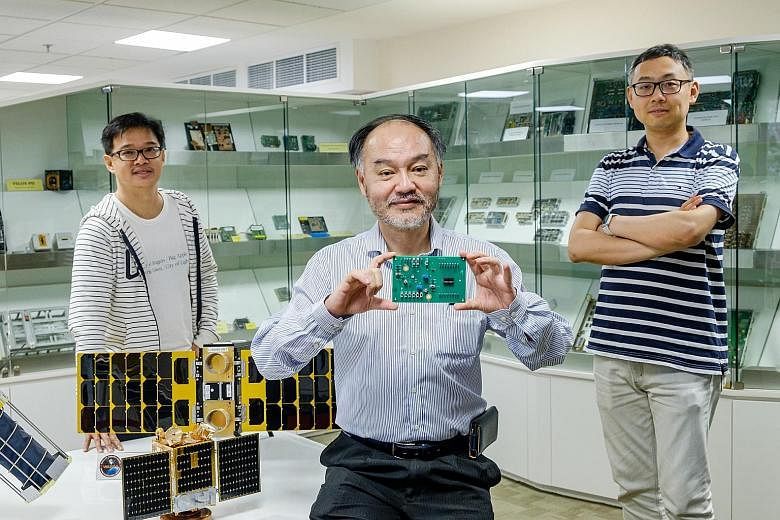A group of six researchers at Nanyang Technological University (NTU) has invented new hardware that it says will significantly reduce costs for electronics used in satellites and improve protection for them in space.
Known as the Latchup Detection and Protection (LDAP) chip, it was launched yesterday by Zero-Error Systems (ZES), a Singapore start-up that was incubated at NTU.
The chip works by detecting radiation and shutting down electronics so that they are not damaged by it. The current industry practice is to protect the entire set of electronics from radiation, a very expensive process.
Installing the chip sidesteps this by simply turning off the circuit until the radiation has passed.
"It's like having somebody to open and close an umbrella when it rains instead of paying for a giant shelter over the whole area," said an NTU spokesman.
The chip will allow consumer-grade electronics - such as those in smartphones - to be used in space instead of outdated technology that is still used because it has been found to be reliable or was specially produced for space.
The team, led by Professor Joseph Chang from NTU's School of Electrical and Electronic Engineering, has been working on the product for six years.
"This technology will increase the reliability, availability and cost-effectiveness of launching and keeping satellites in space," said Prof Chang.
"By using our LDAP chip, satellite manufacturers are now able to employ the latest consumer-grade electronics, such as those used in mobile phones, to build satellites."
Singapore's pivot towards investment in the space industry began in 2013 with the creation of the Office for Space Technology and Industry, an Economic Development Board programme that comprises multiple government agencies.
Since then, Singapore-based companies have launched multiple satellites - including the first locally made commercial micro-satellite, called TeLEOS-1, in 2015.
In yesterday's NTU statement, ZES said it has secured $2.5 million in seed funding from investors such as Airbus Ventures, a global player in the space industry.
Dr Tang Pen San, co-founder and managing director of ZES, said the new funding will enable the start-up to quickly scale up its operations and work with international customers to deploy its products into space and in other applications, including self-driving vehicles.
"Besides reducing the cost substantially, state-of-the-art consumer-grade devices like AI (artificial intelligence) chips will also enhance the functionalities and performance of these new satellites," said Dr Tang.
The LADP chip looks set to make it into space next year, and has already been installed as part of the radiation-protection circuitry in three satellites built by the Kyushu Institute of Technology in Japan, for three countries - Japan, Paraguay and the Philippines.


